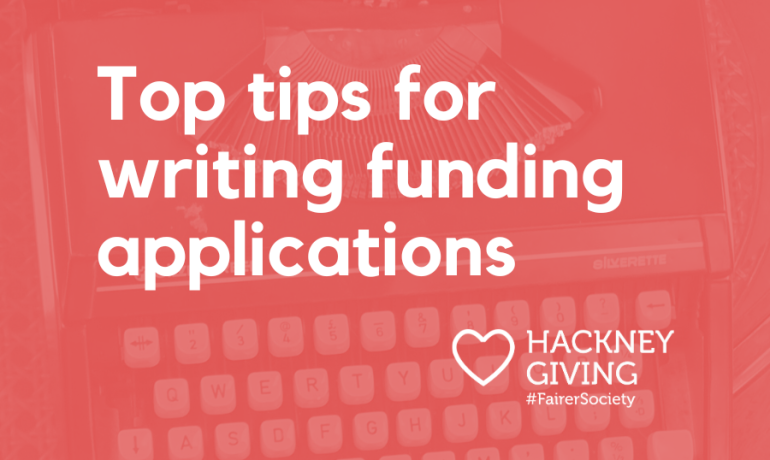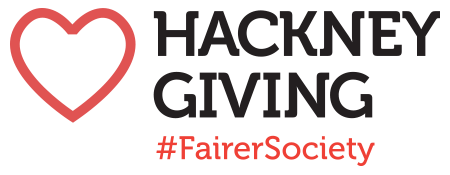
Visit to community groups for business supporters
We recently took business supporters of Hackney Giving to see three community groups operating in the borough.

Sarah Watson, Hackney Giving’s Development and Programme Manager, shares her tips on what to do when applying for Hackney Giving funding.
My number one tip is: meet the deadline! This is because we can’t accept any applications that come in after the deadline. Late applications end up costing you a lot of time and effort, putting in something that doesn’t even get read. We know how much effort goes into applications. So please, please send it in ahead of the deadline.
My number two tip would also be: meet the deadline. But broader than that, I would say: read the guidance. Read it carefully and make sure that you believe that your project fits what we are asking for. Because, if we are asking for projects to grow apples, and your project is to play football, then that’s not going to fit.
Read all the guidance, particularly the eligibility criteria and what the funding is for, and the project dates. Some projects are time-bound, so take note of these kinds of detail in there.
We do How to Apply workshops before each funding round. Although the workshops do give the same information as in the guidance, we aim to present the information in a way that’s different, that brings it to life a bit. And applicants get to ask questions. So, the workshops are great if you like hearing that information rather than reading it.
In the Hackney Giving team, we can’t comment on individual project applications in advance – but our colleagues in Organisational Development can! One-to-one support is available from the Hackney CVS Organisational Development team to help you with your application. You can contact them to discuss your project idea and how to start your application or if you have a draft application they can provide feedback. Book an appointment
Make sure it adds up – we do check and if it doesn’t add up, that makes us lose confidence in your project and your planning
Tip number five: make sure your budget adds up. And in addition, make sure your budget matches what you’ve put in the rest of your application.
At Hackney Giving, our forms have the project description and then the budget comes at the end. By the time I get to read the budget, there shouldn’t be any surprises! Everything I see in the budget should have already been referenced earlier on in the application. Make sure it adds up – we do check and if it doesn’t add up, that makes us lose confidence in your project and your planning.
Short sentences and short words are fine. I don’t need a sentence that goes on for five or six lines describing things in great detail. We just need to be able to understand what you are asking for, in a way that makes it clear. Actually, if I’m reading many applications, one after another after another, keeping those as simple as possible for me to understand is helpful. Similarly, avoid jargon, and if there are abbreviations, make sure that we are able to understand these terms.
Our scoring framework works on the basis of “clear and convincing”. So, make sure it’s clear: can we tell what it is that you’re describing? And make sure it is convincing. We need to believe that the idea is deliverable, and we need to believe that it is going to work too.
When I’m doing How to Apply workshops, I give the example: “we’re going to go on an excursion to the Earth’s planetary satellite for people of advanced years.” That description is not clear. However, if you said: “we’re going take older people on a trip to the moon” – now that’s clear and we can understand it. But is it convincing? No.
However, if you said: “We’re going to take older people on a day trip to the seaside”- now it’s clear and it’s convincing.
Don’t miss anything out. If you haven’t filled in all the boxes, you’re not giving us all the information we need. There’s always a reason why we ask a particular question. So make sure you fill in all the boxes.
We don’t have word limits on our forms but we do have a suggested word count. If you’ve written one sentence and it says it’s 150 to 250 words, that one sentence is probably not enough. If you’ve written several pages then that’s too much.
My final tip is: please do send the supporting documentation that we ask for. At Hackney Giving we always ask for your most recent set of accounts. The first time you apply, we also ask for your constitution or set of rules, policies, as well as proof of bank account. We hold them on file, so people don’t need to send it in the second time that they apply. But the accounts change each year of course, which is why we ask for them each time.
So, please do try and send in supporting documentation. Or include an explanation if something is not relevant, for one reason or another.
Good luck… oh, and… please do meet the deadline!

We recently took business supporters of Hackney Giving to see three community groups operating in the borough.

Hackney Giving’s Cost of Living funding programme is now open.

Listen to our first ever podcast, about the difference Hackney Giving makes and how to get involved.

© 2025, Hackney CVS, registered charity no 1069736